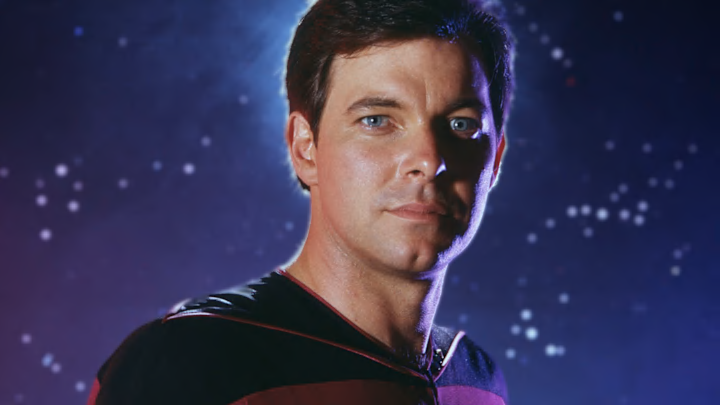"Frame of Mind," Star Trek: The Next Generation’s descent into psychological horror, was devoid of monsters and extraterrestrial predators. Rather, it transformed what was known, the human mind, into the most horrifying battlefield. The episode stands as one of Trek’s most cerebral explorations of identity and sanity, trapping Commander William Riker in a nightmarish maze of collapsing realities. To survive mentally and emotionally in this kind of scenario, Riker must rely not on phasers or force fields, but on unshakable self-knowledge, reason, and instinct, a balancing act that becomes his only weapon against an unraveling sense of self.
The terror of "Frame of Mind" starts quite casually. Frame of Mind is the name of the theater show that Riker is practicing for on board the USS Enterprise-D. He plays a man begging for understanding while confined in a mental asylum during the drama. When the curtain symbolically drops, Riker finds himself alone in a real asylum, and the medical staff there claim that he has gone insane. The Enterprise transforms into a mental hospital, his friends turn into kidnappers, and even his reflection turns against him every time he thinks he has escaped.
Riker follows every rational Starfleet officer's procedures, which is what makes his experience so compelling. He probes his surroundings, pushes the boundaries of his perception, and looks for trends to validate reality. However, the psychological trap gets tighter with each step ahead. Because it undermines the survival skills that typically characterize Star Trek heroes, the episode stands out as an extraordinary horror short. The Federation's cherished principles of reason and logic start to falter, and Riker loses himself in the illusion the more he thinks.
"Frame of Mind" explores mental toughness through character. Riker confronts an adversary that has penetrated his head, in contrast to the heroes of conventional horror movies who escape from outside dangers. Even when his instinct tells him that it would be wise to give up, he must be stubborn; the fight he encounters is one of endurance rather than confrontation. The ability to stay conscious and cling to one unchangeable reality while all other reasoning breaks down around it is necessary for survival in such a nightmare. Riker's Starfleet career and faith in his closest companions reflect such reality.
The times when Riker runs into illusions of Enterprise crew members are where this tenacity is most noticeable. Are they manipulations, delusions, or rescues? Riker briefly lowers his defenses when Jean-Luc Picard issues calm commands or Deanna Troi reassures him, but the asylum soon reappears. He eventually concludes that both logical reasoning and blind faith fall short of his expectations. Not assurance, but the human instinct to reject lies even without proof, rescues him.
The episode's subtle acting and direction heighten the dread. The play's stage and antiseptic asylum blend fact and fiction. Riker's uncertainty is heightened by harsher lighting and tighter camera angles. Jonathan Frakes plays Riker not as an action hero but as a man fighting to retain sanity one breath at a time: his exhaustion, panic, and flashes of defiance grounding the nightmare. “Frame of Mind” transforms the confident first officer into a symbol of every rational person’s worst fear: losing control over their own mind.
After escaping, Riker discovers he was neurologically interrogated on an unknown world. To avoid mental invasion, his subconscious created the asylum illusion from his memories. Riker's silent destruction of the stage set in the episode's closing scenes represents his return to psychological mastery. In this situation, survival means destroying psychological and physical illusions; it means admitting trauma but not allowing it to define him.
So, what survival lessons does “Frame of Mind” offer for anyone trapped in their own Trek-style mental horror?
- Question reality, but don’t let it consume you. Riker’s initial mistake was relying solely on rational inquiry. Sometimes survival depends on emotional anchors—holding tight to personal truth and instinct.
- Reject false certainty. The episode’s terror thrives on manipulation of truth. The ability to say “No, this isn’t right,” even without evidence, becomes transformative.
- Resilience over revelation. Riker succeeds by resisting the illusion long enough for help to arrive, not by figuring out how it works. To put it another way, sometimes perseverance is more important for survival than escape.
- Trust your own identity. In psychological horror, remembering who you are is the last defense. Riker’s stubborn confidence in himself, his role, his duty, and his empathy, saves him when all else fails.
“Frame of Mind” is one of TNG’s most disturbing episodes because it blends horror and reflection. It's not just about fear; even heroes can shatter under uncertainty, and survival sometimes requires rebuilding. In a cosmos of aliens, temporal rifts, and godlike beings, the episode reminds us that the scariest frontier is within our thoughts.
Share your "Frame of Mind" and comments with us on the Redshirts Always Die Facebook and X pages.
Star Trek: The Next Generation is available to stream on Paramount+.
Plus, those who don't subscribe to the service can watch "Frame of Mind" and every episode of TNG season 6 for free on PlutoTV.
